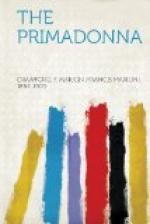‘Very well,’ Logotheti answered. ’I promise not to bring any more. I think you are very wise to make the resolution, if you really think they hurt you—though I don’t see why they should.’
Like most weak people who make good resolutions, Mr. Feist did not realise what he was doing. He understood horribly well, forty-eight hours later, when he was dragging himself at his tormentor’s feet, entreating the charity of half a cigarette, of one teaspoonful of liquor, of anything, though it were deadly poison, that could rest his agonised nerves for a single hour, for ten minutes, for an instant, offering his life and soul for it, parching for it, burning, sweating, trembling, vibrating with horror, and sick with fear for the want of it.
For Logotheti was an Oriental and had lived in Constantinople; and he knew what opium does, and what a man will do to get it, and that neither passion of love, nor bond of affection, nor fear of man or God, nor of death and damnation, will stand against that awful craving when the poison is within reach.
CHAPTER XVII
The society papers printed a paragraph which said that Lord Creedmore and Countess Leven were going to have a week-end party at Craythew, and the list of guests included the names of Mr. Van Torp and Senorita da Cordova, ‘Monsieur Konstantinos Logotheti’ and Mr. Paul Griggs, after those of a number of overpoweringly smart people.
Lady Maud’s brothers saw the paragraph, and the one who was in the Grenadier Guards asked the one who was in the Blues if ’the Governor was going in for zoology or lion-taming in his old age’; but the brother in the Blues said it was ’Maud who liked freaks of nature, and Greeks, and things, because they were so amusing to photograph.’
At all events, Lady Maud had studiously left out her brothers and sisters in making up the Craythew party, a larger one than had been assembled there for many years; it was so large indeed that the ‘freaks’ would not have been prominent figures at all, even if they had been such unusual persons as the young man in the Blues imagined them.
For though Lord Creedmore was not a rich peer, Craythew was a fine old place, and could put up at least thirty guests without crowding them and without causing that most uncomfortable condition of things in which people run over each other from morning to night during week-end parties in the season, when there is no hunting or shooting to keep the men out all day. The house itself was two or three times as big as Mr. Van Torp’s at Oxley Paddox. It had its hall, its long drawing-room for dancing, its library, its breakfast-room and its morning-room, its billiard-room, sitting-room, and smoking-room, like many another big English country house; but it had also a picture gallery, the library was an historical collection that filled three good-sized rooms, and it was completed by one which had always




